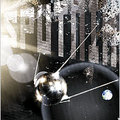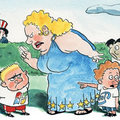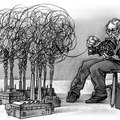Crowds love Barack Obama. But can the charismatic young senator from Illinois lead?
| |
 | |
LIKE a movie star, he is late, but that only whets his fans’ appetite to see him. Thousands stand under the vicious midday sun in a park in Reno, Nevada. No other presidential candidate could pull such a large, passionate or politically diverse crowd. Reggie Willis, a medical student, voted for George Bush in 2004 but now says Barack Obama is “the guy America is waiting for”.
Mr Obama eventually moseys onto the stage and starts massaging the crowd with his seductive baritone. He calls for a new, less selfish, less timid politics that “reflects the core decency of the American people”. The crowd is too wound up in loving him to wonder what, in practice, that might actually involve.
Three years ago no one had heard of Mr Obama—he was just a local politician in Illinois. Then he gave a keynote address at the Democratic Party’s convention in 2004, when he was running for a seat in the US Senate. He was, he told the convention, the son of a Kenyan man who grew up herding goats and went to school in a tin-roof shack. His father got a scholarship “to study in a magical place, America”, where he married a white woman from Kansas. Although they were not rich, their son went to Harvard. “In no other country on earth is my story even possible,” he said.
He won his Senate race easily. Could he go further? The idea that he could run for president at first seemed absurd. But Mr Obama’s evident star power makes it seem plausible.
It probably helps that he is black (or, at least, mixed-race). A generation ago, this would have been a fatal disadvantage. But now many white Americans would love to elect a black president, to demonstrate to the world and themselves that they are not bigots. In a recent study by the Pew Research Centre, 92% of Americans said they would be prepared to vote for a black candidate, up from 37% in 1958. This is a big change, and Mr Obama is well-positioned to take advantage of it.
Some black Americans worry that he is not really one of them because his ancestors were not brought to America as slaves and he played no role in the civil-rights movement. He addressed such worries, brilliantly, in a speech in Selma, Alabama, on the anniversary this year of a voting-rights march that was violently dispersed. Without the civil-rights movement, he said, his white mother and black father might not have wed. “So don’t tell me”, he said, “I don’t have a claim on Selma, Alabama. Don’t tell me I’m not coming home to Selma, Alabama.”
Can all this charisma win him the nomination? The polls say probably not. He cannot match Hillary Clinton’s organisation on the ground. He trails her by ten points or so in national polls of likely Democratic primary voters (see chart), and he leads in none of the early primary states. On the other hand, he raised more money for the primaries than Mrs Clinton in the first quarter of this year—an astonishing feat for a newcomer. So he must be taken seriously. What, then, does he stand for?
 | |
On Iraq, his position is clear. Unlike his main rivals, he opposed the war from the start. But he is no dove. He says that “no president should ever hesitate to use force”, unilaterally if necessary, when America or its vital interests are attacked or threatened.
On foreign policy more broadly, he is both ambitious and idealistic. He would strengthen NATO, build new alliances in Asia, halt the genocide in Darfur, push for peace in the Middle East and help the world’s poorest countries build functioning market economies. Admirable goals, but he gives only a sketchy idea as to how he would achieve any of them.
His support for free trade is tepid. He favours trade deals only if foreigners agree to a host of labour and environmental standards and if American workers who lose their jobs are well looked after. He favours universal health care, but his plan is both less bold and less rigorously costed than that of his Democratic rival, John Edwards.
An Obama presidency would signal to many, in and outside America, that the American dream still works. His opposition to the two policies that have hurt America’s image most—invading Iraq and making use of torture—will convince many that he represents a fresh start. But his inexperience is worrisome, and the source of Mrs Clinton’s greatest advantage over him. As George Will, a conservative columnist, put it, he is asking Americans to “treat the presidency as a nearly entry-level political office”.




